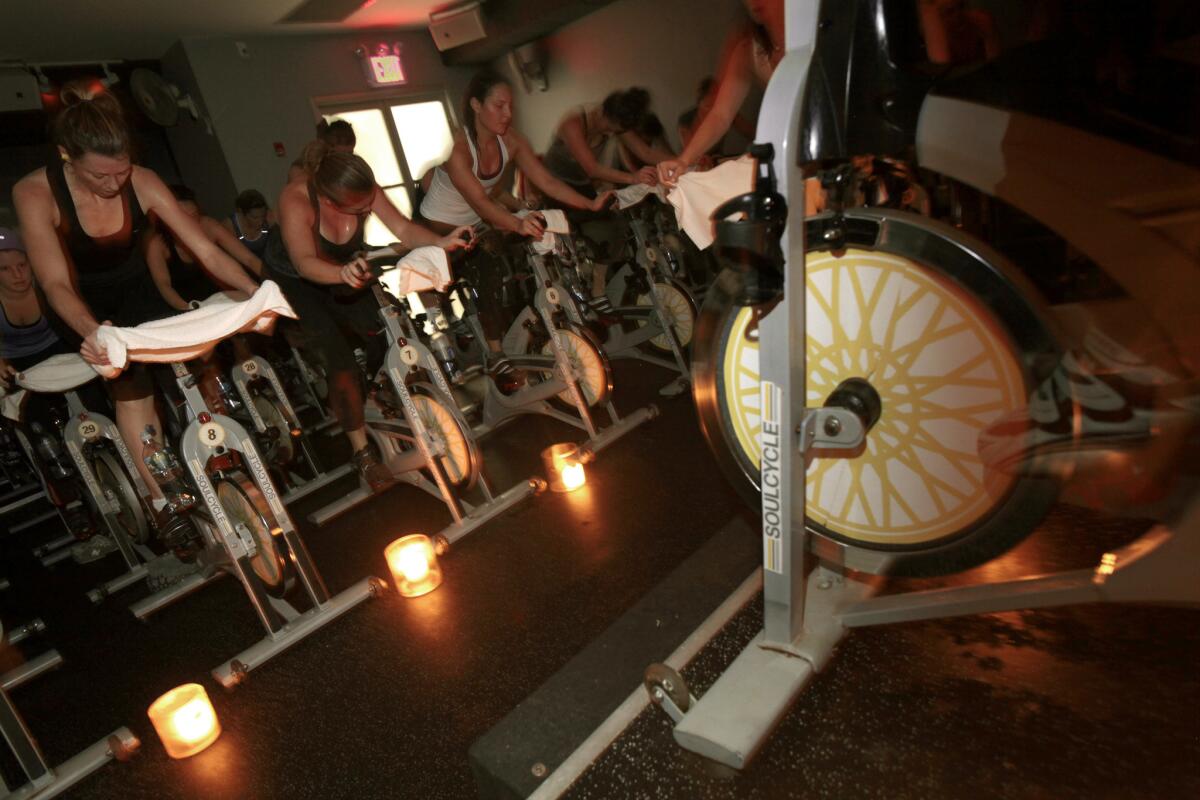SoulCycle, gearing up for expansion, files for initial public offering

SoulCycle, the popular indoor cycling fitness chain, has filed for an initial public offering.
- Share via
Los Angeles may have created the indoor cycling phenomenon, but it’s a New York company that’s taken advantage of the trend’s peaking popularity and going public.
SoulCycle, the biggest indoor cycling chain in the U.S., has filed for an initial public offering and is planning to expand from 46 studios on the East and West coasts to 250 locations.
SoulCycle is among a raft of cycling start-ups across the nation -- New York-based Flywheel and Cincinnati-based CycleBar being two of its main competitors -- but the fitness chain sees itself as more of an “aspirational lifestyle brand” than just a regular workout.
In documents filed Thursday, SoulCycle described its setting as a “dark, candlelit room” with “high-energy music.”
“Our riders move in union as a pack to the beat,” said the company, which launched in 2006. “The experience is tribal. It is primal. And it is fun.”
According to the filing, more than 300,000 riders have experienced the “cardio party,” which involves 35 to 40 minutes of stationary bike riding, hand weight exercises and a cool-down stretch.
The studios average 72,000 rides per week, and 30% of weekly rides are reserved within the first 15 minutes of availability, according to the filing.
Revenue increased from $7.8 million in 2012 to $26.5 million in 2014. Upscale fitness center company Equinox Holdings Inc. owns a majority stake in SoulCycle.
The company didn’t list any details of how much it was looking to raise.
The company’s major market is New York, where it owns 24 studios, but SoulCycle has made headway in Southern California, where there are nine studios. One of the founders, Julie Rice, worked in Hollywood for eight years as a talent agent.
Los Angeles is a breeding ground for indoor cycling classes.
The workout routine was created in 1989 by Johnny Goldberg, better known as Johnny G. A year later, he opened the first Spinning Centre in Santa Monica. The company he co-founded, Mad Dogg Athletics Inc., even trademarked the terms “Spin,” “Spinning” and “Spinner.”
“What made it a hit for many years was the community, the motivation and what was happening as a group,” he said. “The big thing about Spinning was it was for everybody at all levels.”
Indoor cycling has become one of the fastest-growing segments of the boutique fitness industry, made up of smaller, specialized gyms for activities like barre, martial arts and yoga.
About 21% of fitness club patrons say they belong to one of these boutiques, according to a 2015 report on health club data from the International Health, Racquet & Sportsclub Assn.
The popularity of indoor cycling has been helped by the boom in measurement devices that allow participants to keep track of their progress, said fitness expert Keli Roberts.
“People are very numbers-oriented now,” she said. “I think that ensures that where indoor cycling is going, it’s going to hang around.”
But the appeal of SoulCycle is also the spiritual experience, she said.
“It’s an emotionally connected workout,” she said. “It’s all about motivation.”
Celebrity participants like Lady Gaga don’t hurt, either.
“SoulCycle is probably the biggest name in the indoor cycling studio market,” said Pamela Kufahl, director of content and engagement at Club Industry, a fitness industry publication. “They have a huge, cult-like following and they’re doing very well.”
But at $30 or more a class, the appeal of SoulCycle could be limited.
“The ability for SoulCycle to maintain its leadership position may be lessened as CycleBar and Flywheel and other cheaper-priced competitors continue to grow,” Kufahl said.
For more business news, follow @smasunaga.
More to Read
Inside the business of entertainment
The Wide Shot brings you news, analysis and insights on everything from streaming wars to production — and what it all means for the future.
You may occasionally receive promotional content from the Los Angeles Times.











